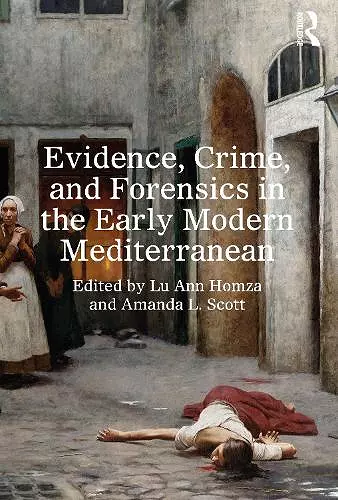Evidence, Crime, and Forensics in the Early Modern Mediterranean
Lu Ann Homza editor Amanda L Scott editor
Format:Paperback
Publisher:Taylor & Francis Ltd
Published:29th Aug '25
Should be back in stock very soon
This paperback is available in another edition too:
- Hardback£155.00(9781032781471)

Recent historians have pinpointed the ways in which legal systems in early modern Europe were improvisational, flexible, and contingent rather than immovable, hierarchical, and gendered. Evidence, Crime, and Forensics in the Early Modern Mediterranean amplifies such findings by looking at law and its consumers in the Mediterranean, broadly imagined, between 1500 and 1750. The volume’s essays enhance our awareness of how crimes were defined, evidence was offered, and forensic awareness appeared in secular, inquisitorial, and specially commissioned courts in Spain, Italy, and the Hapsburg Balkans.
This collection threads an important needle: our authors recognize formal chains of command and legal commonplaces but nonetheless emphasize how such factors could be challenged, manipulated, or ignored by illiterate and vulnerable populations. It turns out that ordinary individuals in the early modern Mediterranean did not find themselves limited in their legal options, and their degree of sophistication in court speaks volumes about networks of legal knowledge. Furthermore, in no way does the use of the courts between 1500 and 1750 imply more “rational” ways of seeking justice, since emotions were always firmly on display, even if rage and regret were being deployed for performative reasons.
Evidence, Crime, and Forensics in the Early Modern Mediterranean illustrates the range of questions we can put to archival sources from the early modern Mediterranean, with plentiful insights as to how legal sources can illuminate history from below. This collection will be a welcome addition for undergraduate and graduate courses on European history, as well as a provocative resource for more general audiences.
‘A beautifully nuanced yet incisive overview of the cultural and social dimensions of law and courts in the early modern Mediterranean. The highly original chapters maintain an impressive balance between theory and practice and offer many valuable insights on the very nature of early modern law in the real world’ - Joel F. Harrington, Vanderbilt University.
‘Where ordinary folk crossed paths with the tribunals, both the men and women of early modern Spain and Italy and the men of law themselves developed canny ways of gathering, reading, and deploying evidence to deal with crimes and to navigate delinquency's great web of social and institutional concerns. Legal matters had their subtle epistemologies and rhetorics, both official and lay. In this book, skilled scholars explore those modes of legal knowing and disputing, engaging, inter alia, the abuse of children, the authority of disabled witnesses, the credibility of midwives as expert witnesses where miscarriages were provoked by violence, the growing authority of medical expertise, plus awkward peace-making between unequals, seduction and abandonment, infanticide, spousal murder, the Inquisition's evolving take on witchcraft, the elaborate procedures of Bologna's highest court, and, in an Eastern European excursion, villagers' panicky responses to their ungrateful un-dead. This lively collection, rich and varied, is an open-minded, handy tour of current work and an entry point to the many lines of investigation of an archival record as rich and varied as it is piquant and beguiling’ - Thomas V. Cohen, York University, Toronto (emeritus).
ISBN: 9781032781464
Dimensions: unknown
Weight: 470g
242 pages